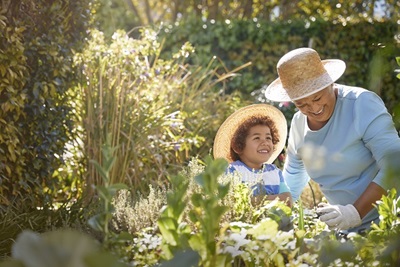Managing the challenges of summer
by Brenda Juskavitch

Summer is a great time of year. Lots of sunshine, long daylight hours, and warm temperatures mean we can enjoy the outdoors and take much-needed vacations.
But the high temperatures and humidity that can happen between June and September can be taxing—especially on older adults and people with chronic health conditions. For caregivers, it’s important to understand the impact the weather can have on loved ones and know how to handle potential challenges.
The effects of heat and humidity
Hot weather affects everyone, but older adults are often more sensitive and vulnerable to heat. Here’s why:
- The ability to regulate body temperature naturally declines with age, which means sensitivities to heat and cold increase.
- Thirst also declines with age, so older adults may become dehydrated more quickly in hot weather.
- Certain chronic health conditions—like cardiovascular, lung, or kidney diseases—can negatively affect someone’s response to heat.
- Some prescription medications may:
- Affect the body’s ability to regulate temperature or sweat
- Make the skin more sensitive to the sun
- Cause dehydration
It’s also important to note that extreme temperatures can affect the stability of certain medications. For example, excessive heat can cause the coatings on some prescriptions to peel, melt, or crack, which can alter their effectiveness.
High humidity is also concerning. When it’s very humid, you sweat more. However, the sweat doesn’t evaporate as quickly, making it harder for the body to cool itself. You end up feeling hot and sticky and can become dehydrated more easily. High humidity also increases risk for heat-related illnesses, can disrupt sleep, and can cause irritability.
Heat-related illnesses
It’s important to know the signs of heat-related conditions like heat sensitivity and heat stroke. According to Mass.gov, heat-related illnesses occur more often in Massachusetts when outdoor temperatures are 90ºF or higher.
Heat sensitivity is when the body has a hard time cooling itself. While heat sensitivity is uncomfortable, it isn’t a medical emergency. However, medical care can help keep it from escalating to heat stroke. Symptoms of heat insensitivity (or heat exhaustion) include:
- Muscle cramps
- Headaches
- Nausea
- Dizziness
- Weakness
- Excessive sweating
- Rapid heartbeat
Heat stroke is severe and requires immediate medical attention. During heat stroke, core body temperature quickly rises to dangerous levels (above 104ºF). These other symptoms may occur:
- Confusion
- Agitation
- Slurred speech
- Irritability
- Seizures
- Delirium
If you or your loved one experience any of these symptoms of heat stroke, get medical help right away.
Hot-weather safety
Thankfully, there are many things that can help you and your loved one to minimize or avoid heat-related conditions.
- Drink lots of water, even if not thirsty, and avoid alcohol and caffeinated beverages.
- Stay in air-conditioned spaces.
- Use a fan to circulate the air, which has a cooling effect.
- Wear lightweight, loose-fitting clothing.
- Avoid strenuous activities—especially during peak heat hours (usually mid- or late morning to late afternoon).
- If you must be outside, find shade, wear a wide-brimmed hat, and apply sunscreen.
- Take cool showers or baths.
Be prepared for power disruptions
Summer storms and increased electricity use cause power outages at any time of day or night. Ease your mind by making sure that you and your loved one are prepared.
- Set up alerts for heat advisories. Power outages often occur during periods of extreme heat.
- Stock up on clean water. Try to have a week’s supply of at least 2 gallons per person per day.
- Have battery-powered portable fans and flashlights on hand—and plenty of fresh batteries.
- Keep well-insulated coolers and cold packs handy to help protect temperature-sensitive medications.
- Make sure smoke detectors and carbon monoxide detectors work.
- Keep cell phones, laptops, and portable chargers fully charged.
- If your loved one needs oxygen, contact your electric company to get on a list for priority service in case the power goes out. Or consider buying or borrowing a generator.
- Know the locations of the closest community cooling centers. These can be libraries, town halls, and senior centers.
Remember to enjoy what summer has to offer
There’s lots to love about summer. The sunshine supports vitamin D production and boosts mood. Gardens are full of beautiful flowers and tasty fruits and vegetables. Beaches and parks provide opportunities to swim, picnic, and play games.
Summer pastimes help everyone relax, recharge, and socialize—and they’re a great way to be more active, which is good for overall health and well-being. Make sure both you and your loved one make the most of what summer has to offer.